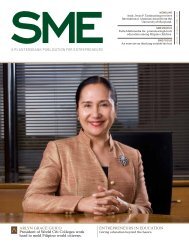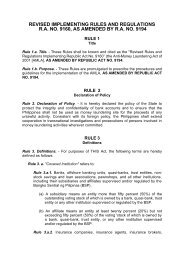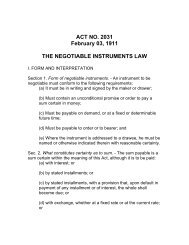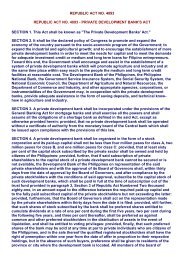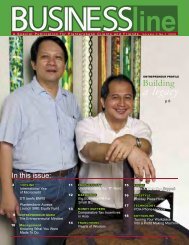- Page 2:
FOREWORDThe 2011 Manual of Regulati
- Page 5 and 6:
LIST OF APPENDICESList of Appendice
- Page 7 and 8:
List of Appendices11.12.31No.SUBJEC
- Page 9 and 10:
List of Appendices11.12.31No. SUBJE
- Page 11 and 12:
POWER OF THE BANGKO SENTRAL TO EXAM
- Page 13 and 14:
§§ 4101Q - 4101Q.108.12.31PART ON
- Page 15 and 16:
§§ 4101Q.2 - 4101Q.308.12.31c. Tw
- Page 17 and 18:
§§ 4101Q.5 - 4101Q.608.12.31§ 41
- Page 19 and 20:
§§ 4102Q.1 - 4103Q08.12.31f. The
- Page 21 and 22:
§§ 4108Q - 4108Q.309.12.31C. MERG
- Page 23 and 24:
§ 4108Q.308.12.31f. Relocation of
- Page 25 and 26:
§§ 4114Q - 4116Q.211.12.31Sec. 41
- Page 27 and 28:
§ 4116Q.211.12.31(xii) It must be
- Page 29 and 30:
§ 4116Q.308.12.31examination as ap
- Page 31 and 32:
§§ 4116Q.3 - 4116Q.408.12.31(a) I
- Page 33 and 34:
§ 4116Q.408.12.31m. Forward asset
- Page 35 and 36:
§§ 4117Q - 4119Q09.12.31to risk a
- Page 37 and 38:
§§ 4136Q.2 - 4136Q.408.12.31§ 41
- Page 39 and 40:
§§ 4136Q.4 - 4141Q.108.12.31on su
- Page 41 and 42:
§§ 4141Q.1 - 4141Q.308.12.31direc
- Page 43 and 44:
§ 4141Q.308.12.31responsible for t
- Page 45 and 46:
§ 4141Q.308.12.31practical strateg
- Page 47 and 48:
§§ 4141Q.4 - 4142Q11.12.31Confirm
- Page 49 and 50:
§ 4143Q.108.12.31government agency
- Page 51 and 52:
§§ 4143Q.1 - 4143Q.210.12.31direc
- Page 53 and 54:
§§ 4143Q.3 - 4143Q.408.12.31§ 41
- Page 55 and 56:
§§ 4143Q.4 - 4143Q.508.12.31the f
- Page 57 and 58:
§ 4145Q09.12.31disadvantages that
- Page 59 and 60:
§§ 4146Q - 4148Q08.12.31schedule
- Page 61 and 62:
§§ 4149Q.9 - 4150Q08.12.31The imp
- Page 63 and 64:
§§ 4151Q.5 - 4160Q.310.12.31h. Bu
- Page 65 and 66:
§ 4160Q.310.12.31or corrected cert
- Page 67 and 68:
§§ 4174Q - 4180Q.108.12.31to prov
- Page 69 and 70:
§§ 4180Q.4 - 4180Q.808.12.31direc
- Page 71 and 72:
§§ 4185Q.9 - 4186Q.308.12.31direc
- Page 73 and 74:
§ 4190Q08.12.31volume of past due
- Page 75 and 76:
§§ 4190Q - 4190Q.408.12.31adjusti
- Page 77 and 78:
§§ 4191Q - 4191Q.311.12.31Sec. 41
- Page 79 and 80:
§§ 4192Q - 4192Q.208.12.31or subs
- Page 81 and 82:
§§ 4192Q.2 - 4192Q.308.12.31b. Fi
- Page 83 and 84:
§§ 4201Q - 4235Q.308.12.31PART TW
- Page 85 and 86:
§§ 4235Q.5 - 4235Q.611.12.31date
- Page 87 and 88:
§ 4235Q.1208.12.31being sold on a
- Page 89 and 90:
§§ 4237Q.2 - 4237Q.308.12.31c. Th
- Page 91 and 92:
§§ 4239Q.4 - 4239Q.608.12.31§ 42
- Page 93 and 94:
§§ 4254Q - 4254Q.308.12.31capital
- Page 95 and 96:
§§ 4256Q.5 - 4277Q08.12.31adopted
- Page 97 and 98:
§ 4301Q08.12.31PART THREELOANS, IN
- Page 99 and 100:
§ 4301Q.609.12.31concentrations of
- Page 101 and 102:
§§ 4303Q11.12.31the payment of pr
- Page 103 and 104:
§§ 4304Q.110.12.31amounts and for
- Page 105 and 106:
§§ 4304Q.1 - 4304Q.1010.12.31exte
- Page 107 and 108:
§§ 4304Q.12 - 4305Q.310.12.31b. r
- Page 109 and 110:
§§ 4305Q.5 - 4306Q.108.12.31§ 43
- Page 111 and 112:
§§ 4306Q.5 - 4307Q.108.12.31(5) B
- Page 113 and 114:
§§ 4307Q.2 - 4309Q.108.12.31state
- Page 115 and 116:
§§ 4320Q.1 - 4320Q.210.12.31penal
- Page 117 and 118:
§§ 4320Q.4 - 4320Q.710.12.31amoun
- Page 119 and 120:
§§ 4320Q.12 - 4320Q.1410.12.31aga
- Page 121 and 122:
§§ 4322Q.1 - 4322Q.208.12.31(1) W
- Page 123 and 124:
§§ 4326Q - 4326Q.108.12.31No QB s
- Page 125 and 126:
§§ 4328Q - 4328Q.509.12.31where t
- Page 127 and 128:
§ 4328Q.509.12.31ceilings until th
- Page 129 and 130:
§§ 4330Q - 4333Q08.12.31Sec. 4330
- Page 131 and 132:
§§ 4336Q - 4340Q08.12.31accommoda
- Page 133 and 134:
§§ 4343Q.1 - 4382Q10.12.31§ 4343
- Page 135 and 136:
§§ 4388Q.5 - 4394Q.211.12.31a. Fi
- Page 137 and 138:
§§ 4394Q.3 - 4394Q.1508.12.31of t
- Page 139 and 140:
§ 4394Q.1508.12.31(3) Relationship
- Page 141 and 142:
§§ 4401Q - 4403Q11.12.31PART FOUR
- Page 143 and 144:
§§ 4403Q - 4404Q.308.12.31which c
- Page 145 and 146:
§§ 4404Q.4 - 4405Q.208.12.31§ 44
- Page 147 and 148:
§§ 4405Q.4 - 4405Q.508.12.31(2) S
- Page 149 and 150:
§§ 4405Q.6 - 4406Q.108.12.31Depar
- Page 151 and 152:
§§ 4406Q.2 - 4406Q.409.12.31desig
- Page 153 and 154:
§§ 4407Q - 4408Q09.12.31of a debt
- Page 155 and 156:
§ 4408Q.908.12.31P30,000 a day on
- Page 157 and 158:
§§ 4409Q.2 - 4409Q.408.12.31e. In
- Page 159 and 160:
§§ 4409Q.7 - 4409Q.909.12.31§ 44
- Page 161 and 162:
§ 4409Q.909.12.31under one (1) liv
- Page 163 and 164:
§§ 4409Q.16 - 4409Q.1708.12.31f.
- Page 165 and 166:
§§ 4409Q.17 - 4410Q.508.12.31and
- Page 167 and 168:
§§ 4410Q.6 - 4410Q.708.12.31Fund
- Page 169 and 170:
§§ 4410Q.7 - 4410Q.808.12.31In ad
- Page 171 and 172:
§§ 4410Q.11 - 4411Q.108.12.31§ 4
- Page 173 and 174:
§§ 4411Q.4 - 4411Q.708.12.31R.A.
- Page 175 and 176:
§§ 4411Q.9 - 4413Q09.12.31b. Fund
- Page 177 and 178:
§§ 4414Q.1 - 4415Q.308.12.31major
- Page 179 and 180:
§§ 4416Q - 4421Q09.12.31a. Invest
- Page 181 and 182:
§§ 4424Q - 4425Q.309.12.31obtaini
- Page 183 and 184:
§§ 4426Q.1 - 4428Q09.12.31activit
- Page 185 and 186:
§§ 4441Q.4 - 4441Q.511.12.31§ 44
- Page 187 and 188:
§§ 4441Q.7 - 4441Q.911.12.31docum
- Page 189 and 190:
§§ 4441Q.14 - 4499Q08.12.31§ 444
- Page 191 and 192:
§§ 4506Q - 4599Q08.12.31Secs. 450
- Page 193 and 194:
§§ 4601Q.1 - 4601Q.209.12.31Gover
- Page 195 and 196:
§§ 4611Q - 4611Q.209.12.31to, the
- Page 197 and 198:
§§ 4611Q.2 - 4611Q.309.12.31appli
- Page 199 and 200:
§§ 4611Q.6 - 4625Q.209.12.31only
- Page 201 and 202:
§§ 4625Q.5 - 4625Q.1408.12.31§ 4
- Page 203 and 204:
§§ 4651Q.1 - 4651Q.408.12.31h. Is
- Page 205 and 206:
§§ 4651Q.7 - 4651Q.1208.12.31Prov
- Page 207 and 208:
§§ 4651Q.15 - 4651Q.1908.12.31and
- Page 209 and 210:
§§ 4701Q - 4701Q.209.12.31PART SE
- Page 211 and 212:
§§ 4701Q.5 - 4701Q.1209.12.31b. O
- Page 213 and 214:
§ 4780Q.409.12.31shall be consolid
- Page 215 and 216:
§§ 4781Q - 4799Q09.12.31Secs. 478
- Page 217 and 218:
§ 4803Q11.12.31result of which he
- Page 219 and 220:
§ 4803Q - 4805Q11.12.31beneficiary
- Page 221 and 222:
§§ 4805Q.211.12.31terrorism finan
- Page 223 and 224:
§§ 4805Q.4 - 4806Q.1.a.11.12.31of
- Page 225 and 226:
§§ 4806Q.1.c. - 4806Q.1.e.1.11.12
- Page 227 and 228:
§§ 4806Q.2.a. - 4806Q.2.c.11.12.3
- Page 229 and 230:
§§ 4806Q.2.d. - 4806Q.2.e.1.a.11.
- Page 231 and 232:
§§ 4806Q.2.h. - 4806Q.2.i.11.12.3
- Page 233 and 234:
§§ 4806Q.2.j.2. - 4806Q.2.m.11.12
- Page 235 and 236:
§§ 4806Q.3.a. - 4807Q.111.12.31b.
- Page 237 and 238:
§§ 4807Q.5 - 4808Q11.12.31§ 4807
- Page 239 and 240:
§§ 4810Q - 4899Q11.12.31F. BSP Au
- Page 241 and 242:
§§ 4902Q.1 - 4902Q.209.12.31(2) T
- Page 243 and 244:
§§ 4921Q - 4931Q.208.12.31g. Deli
- Page 245 and 246:
§ 4931Q.208.12.31(2) The assessmen
- Page 247 and 248:
§§ 4931Q.5 - 4999Q08.12.31(1) Fai
- Page 249 and 250:
APP. Q-108.12.31e. Organization, Di
- Page 251 and 252:
APP. Q-208.12.31E. Less:Present Com
- Page 253 and 254:
Q RegulationsAppendix Q-3 - Page 2S
- Page 255 and 256:
Q RegulationsAppendix Q-3 - Page 4S
- Page 257 and 258:
Q RegulationsAppendix Q-3 - Page 6S
- Page 259 and 260:
Q RegulationsAppendix Q-3 - Page 8S
- Page 261 and 262:
Q RegulationsAppendix Q-3 - Page 10
- Page 263 and 264:
APP. Q-308.12.31Annex Q-3-aINFORMAT
- Page 265 and 266:
APP. Q-308.12.31Annex Q-3-cREPORTIN
- Page 267 and 268:
APP. Q-308.12.31Annex Q-3-eDOCUMENT
- Page 269 and 270:
APP. Q-408.12.31GUIDELINES ON PRESC
- Page 271 and 272:
APP. Q-408.12.31Annex Q-4-bFORMAT O
- Page 273 and 274:
MINIMUM INTERNAL CONTROL STANDARDS
- Page 275 and 276:
APP. Q-508.12.31these transactions
- Page 277 and 278:
APP. Q-608.12.31STANDARDIZED DEPOSI
- Page 279 and 280:
APP. Q-608.12.31Serial No.(Name of
- Page 281 and 282:
APP. Q-608.12.31Serial No.(Name of
- Page 283 and 284:
APP. Q-608.12.31Serial No.(Name of
- Page 285 and 286:
APP. Q-608.12.31Serial No:(Name of
- Page 287 and 288:
APP. Q-608.12.31Serial No:(Name of
- Page 289 and 290:
APP. Q-708.12.31NEW RULES ON REGIST
- Page 291 and 292:
APP. Q-708.12.31connection with the
- Page 293 and 294:
APP. Q-708.12.31(f) Evidence of ind
- Page 295 and 296:
APP. Q-708.12.31(b) These periodic
- Page 297 and 298:
APP. Q-808.12.31Sec. 3. Conditions
- Page 299 and 300:
APP. Q-808.12.31h. Projected annual
- Page 301 and 302:
APP. Q-808.12.31Sec. 11. Conditions
- Page 303 and 304:
APP. Q-808.12.31Sec. 19. Transitory
- Page 305 and 306:
APP. Q-908.12.31B. The following go
- Page 307 and 308:
APP. Q-1008.12.31a. Loans with unlo
- Page 309 and 310:
APP. Q-1008.12.31C. Credit card rec
- Page 311 and 312:
APP. Q-1008.12.31as a result of the
- Page 313 and 314:
APP. Q-1108.12.316. Finance Charges
- Page 315 and 316:
ABSTRACT OF "TRUTH IN LENDING ACT"
- Page 317 and 318:
APP. Q-13a08.12.31SETTLEMENT PROCED
- Page 319 and 320:
APP. Q-13b08.12.31executed, the ben
- Page 321 and 322:
APP. Q-13b08.12.31PARTICIPATION AGR
- Page 323 and 324:
APP. Q-13b08.12.31Annex 2LETTERHEAD
- Page 325 and 326:
APP. Q-1408.12.31SAMPLE INVESTMENT
- Page 327 and 328:
APP. Q-1408.12.31(4) Loans fully se
- Page 329 and 330:
APP. Q-1408.12.31EFFECTIVITY AND TE
- Page 331 and 332:
APP. Q-1509.12.31Considering that c
- Page 333 and 334:
APP. Q-1509.12.31c. Appropriate ris
- Page 335 and 336:
APP. Q-1509.12.31deteriorating posi
- Page 337 and 338:
APP. Q-1509.12.31(c) Competent and
- Page 339 and 340:
APP. Q-1609.12.31(2) The length of
- Page 341 and 342:
APP. Q-1609.12.31unless a written a
- Page 343 and 344:
APP. Q-1609.12.31knowledge in deriv
- Page 345 and 346: APP. Q-16-a09.12.31establish or mai
- Page 347 and 348: APP. Q-1808.12.31SECURITIES AND EXC
- Page 349 and 350: APP. Q-1808.12.31administration, as
- Page 351 and 352: APP. Q-1808.12.31Sec. 12. Bangko Se
- Page 353 and 354: APP. Q-1908.12.31f. PURCHASE DISCOU
- Page 355 and 356: APP. Q-1908.12.31a) Police clearanc
- Page 357 and 358: APP. Q-1908.12.31Sec. 8. Loans and
- Page 359 and 360: APP. Q-1908.12.31and shall be gover
- Page 361 and 362: APP. Q-2011.12.31(1%) shall be eval
- Page 363 and 364: APP. Q-2011.12.31in the fair value
- Page 365 and 366: APP. Q-2011.12.31recognition, an FI
- Page 367 and 368: APP. Q-2011.12.31securities since t
- Page 369 and 370: APP. Q-2008.12.31after 15 November
- Page 371 and 372: APP. Q-20a08.12.31ESTABLISHING THE
- Page 373 and 374: APP. Q-20a08.12.31Other GuidelinesF
- Page 375 and 376: APP. Q-2108.12.31the BTR and BSP to
- Page 377 and 378: APP. Q-2108.12.317. On the same day
- Page 379 and 380: APP. Q-2108.12.31Annex 1SUPERVISION
- Page 381 and 382: APP. Q-2108.12.31Annex 2-ATo be use
- Page 383 and 384: APP. Q-2108.12.31Annex 3Letterhead
- Page 385 and 386: APP. Q-2108.12.31MEMORANDUMAnnex 5D
- Page 387 and 388: APP. Q-2108.12.31Annex 7MEMORANDUMD
- Page 389 and 390: APP. Q-22-a09.12.31PROFORMA PAYMENT
- Page 391 and 392: APP. Q-23-a08.12.31CERTIFICATION OF
- Page 393 and 394: APP. Q-23-c08.12.31CUSTOMER DUE DIL
- Page 395: APP. Q-23-c08.12.312.2 Specific ide
- Page 399 and 400: APP. Q-23-d08.12.31GENERAL IDENTIFI
- Page 401 and 402: APP. Q-23-e08.12.318. These guideli
- Page 403 and 404: APP. Q-23-e08.12.31principals. What
- Page 405 and 406: APP. Q-23-f08.12.31Anti-Money Laund
- Page 407 and 408: APP. Q-2409.12.31(9) An excessive v
- Page 409 and 410: APP. Q-2508.12.31Presidential Decre
- Page 411 and 412: APP. Q-2508.12.31(o) “Property”
- Page 413 and 414: APP. Q-2508.12.31public funds or ra
- Page 415 and 416: APP. Q-2508.12.31(64) Sale of any c
- Page 417 and 418: APP. Q-2508.12.31(113) Violations o
- Page 419 and 420: APP. Q-2508.12.31(2) to issue order
- Page 421 and 422: APP. Q-2508.12.31verifying their le
- Page 423 and 424: APP. Q-2508.12.31existing laws and
- Page 425 and 426: APP. Q-2508.12.314. All relevant in
- Page 427 and 428: APP. Q-2508.12.31executory. This pr
- Page 429 and 430: APP. Q-2508.12.31execution and sati
- Page 431 and 432: APP. Q-2508.12.31monetary instrumen
- Page 433 and 434: APP. Q-2508.12.31final disposition
- Page 435 and 436: APP. Q-2708.12.31DETAILS ON THE COM
- Page 437 and 438: APP. Q-2808.12.31(1) the assets to
- Page 439 and 440: APP. Q-28-a08.12.31(which is compar
- Page 441 and 442: APP. Q-28-a08.12.31be objectively r
- Page 443 and 444: APP. Q-28-a08.12.311Accounting Entr
- Page 445 and 446: APP. Q-28-a08.12.31B. Statement of
- Page 447 and 448:
APP. Q-2908.12.31GUIDELINES AND MIN
- Page 449 and 450:
APP. Q-2908.12.31Circular No. 388 f
- Page 451 and 452:
APP. Q-3009.12.31of the BSP or the
- Page 453 and 454:
APP. Q-3009.12.31Category B and C u
- Page 455 and 456:
APP. Q-3009.12.31b. A notarized und
- Page 457 and 458:
APP. Q-3009.12.313. In case there a
- Page 459 and 460:
APP. Q-3009.12.31a. An external aud
- Page 461 and 462:
APP. Q-3108.12.31QUALIFICATION REQU
- Page 463 and 464:
APP. Q-3209.12.31RULES AND REGULATI
- Page 465 and 466:
APP. Q-3209.12.31e. The interest of
- Page 467 and 468:
APP. Q-3308.12.31Information/Data R
- Page 469 and 470:
APP. Q-3308.12.31Information/Data R
- Page 471 and 472:
APP. Q-3408.12.31QUARTERLY INVESTME
- Page 473 and 474:
APP. Q-34a08.12.31cash is possible
- Page 475 and 476:
APP. Q-3508.12.31BANGKO SENTRAL RUL
- Page 477 and 478:
APP. Q-3508.12.31submit, within ten
- Page 479 and 480:
APP. Q-3608.12.31FORMAT CERTIFICATI
- Page 481 and 482:
App. Q-3608.12.31Annex Q-36-aFORMAT
- Page 483 and 484:
APP. Q-3709.12.31(iv) Responsibilit
- Page 485 and 486:
APP. Q-3709.12.31review and that BS
- Page 487 and 488:
APP. Q-3811.12.31IMPLEMENTATION OF
- Page 489 and 490:
APP. Q-3811.12.31or instruction dir
- Page 491 and 492:
APP. Q-3811.12.31Annex ATEMPLATE OF
- Page 493 and 494:
APP. Q-3811.12.31The custodian shal
- Page 495 and 496:
APP. Q-3808.12.31Moreover, Circular
- Page 497 and 498:
APP. Q-38a08.12.31DISPOSITION OF CO
- Page 499 and 500:
APP. Q-38b08.12.31Annex AKNOW ALL M
- Page 501 and 502:
APP. Q-38b08.12.31holdings of benef
- Page 503 and 504:
APP. Q-38b08.12.31Sec. 4. Settlemen
- Page 505 and 506:
APP. Q-38b08.12.31INVESTOR’S UNDE
- Page 507 and 508:
APP. Q-38b08.12.317. To hold the BT
- Page 509 and 510:
APP. Q-3909.12.31THE GUIDELINES FOR
- Page 511 and 512:
APP. Q-3909.12.316. Maximum refers
- Page 513 and 514:
App. Q-3908.12.31assets and capital
- Page 515 and 516:
PROMPT CORRECTIVE ACTION FRAMEWORK[
- Page 517 and 518:
APP. Q-4009.12.31facilities. The De
- Page 519 and 520:
APP. Q-4108.12.31Annex ADEBIT/CREDI
- Page 521 and 522:
APP. Q-4208.12.31of traded portfoli
- Page 523 and 524:
APP. Q-4208.12.31c. Ensure that str
- Page 525 and 526:
APP. Q-4308.12.31GUIDELINES ON MARK
- Page 527 and 528:
APP. Q-4308.12.31of this Appendix i
- Page 529 and 530:
APP. Q-4308.12.31expected net cash
- Page 531 and 532:
APP. Q-4308.12.31presented. In asse
- Page 533 and 534:
APP. Q-4308.12.315. Procedures to b
- Page 535 and 536:
APP. Q-4308.12.31Model risk is more
- Page 537 and 538:
APP. Q-4308.12.31simulation, a comp
- Page 539 and 540:
APP. Q-4308.12.31Policies and proce
- Page 541 and 542:
APP. Q-4308.12.31and complexity of
- Page 543 and 544:
APP. Q-4408.12.316. The adequacy of
- Page 545 and 546:
APP. Q-4408.12.31A. Active and Appr
- Page 547 and 548:
APP. Q-4408.12.31Liquidity risk mea
- Page 549 and 550:
APP. Q-4408.12.313. Address adminis
- Page 551 and 552:
APP. Q-4408.12.31of any foreign cur
- Page 553 and 554:
APP. Q-4508.12.31ACKNOWLEDGMENTREPU
- Page 555 and 556:
APP. Q-4611.12.316. The BSP reserve
- Page 557 and 558:
APP. Q-4611.12.31Remaining maturity
- Page 559 and 560:
APP. Q-4611.12.31ii. There is a cha
- Page 561 and 562:
APP. Q-4611.12.31iii. It does not q
- Page 563 and 564:
APP. Q-4611.12.31the pricing date a
- Page 565 and 566:
APP. Q-4611.12.31MSME exposure:a) T
- Page 567 and 568:
APP. Q-4611.12.31ii. Inward bills f
- Page 569 and 570:
APP. Q-4611.12.31charges, as will t
- Page 571 and 572:
APP. Q-4611.12.31guarantee to be re
- Page 573 and 574:
APP. Q-4611.12.31Agency INTERNATION
- Page 575 and 576:
APP. Q-4611.12.31purchased out of t
- Page 577 and 578:
APP. Q-4611.12.31that in which the
- Page 579 and 580:
APP. Q-4611.12.31credit rating of a
- Page 581 and 582:
APP. Q-4611.12.31exhausted; andd) R
- Page 583 and 584:
APP. Q-4611.12.31implies that the e
- Page 585 and 586:
APP. Q-4611.12.3128. A CCF of twent
- Page 587 and 588:
APP. Q-4611.12.31in accordance with
- Page 589 and 590:
APP. Q-4611.12.31Credit ratings of
- Page 591 and 592:
APP. Q-4611.12.318. Gross income, f
- Page 593 and 594:
APP. Q-4611.12.31following informat
- Page 595 and 596:
GUIDELINES ON THE USE OF THE STANDA
- Page 597 and 598:
APP. Q-46b08.12.31for operational r
- Page 599 and 600:
APP. Q-4708.12.31Annex 1(Institutio
- Page 601 and 602:
APP. Q-47a08.12.31SPECIAL DEPOSIT A
- Page 603 and 604:
APP. Q-4811.12.31BASIC STANDARDS IN
- Page 605 and 606:
APP. Q-4811.12.31accounts.iii. Inve
- Page 607 and 608:
APP. Q-4811.12.31(b.) Identificatio
- Page 609 and 610:
APP. Q-4811.12.31investment policie
- Page 611 and 612:
APP. Q-4811.12.31various investment
- Page 613 and 614:
APP. Q-4811.12.31accuracy and relia
- Page 615 and 616:
Appendix Q-49 - Page 2Manual of Reg
- Page 617 and 618:
Appendix Q-49 - Page 4Time of recei
- Page 619 and 620:
APP. Q-5009.12.31j. Organizational
- Page 621 and 622:
APP. Q-5111.12.31Tax DocumentsDue D
- Page 623 and 624:
APP. Q-5209.12.31to ensure that ris
- Page 625 and 626:
APP. Q-5209.12.31a. Risk identifica
- Page 627 and 628:
APP. Q-5209.12.31vi. Commentary on
- Page 629 and 630:
APP. Q-5209.12.31Details of the rel
- Page 631 and 632:
APP. Q-5309.12.31GUIDELINES ON THE
- Page 633 and 634:
APP. Q-5309.12.31risk profile, or d
- Page 635 and 636:
GUIDELINES ON OUTSOURCING OFSERVICE
- Page 637 and 638:
App. Q-5510.12.31In addition, the E
- Page 639 and 640:
APP. Q-5611.31.12this Section shall
- Page 641 and 642:
APP. Q-5611.31.12such creditor, deb
- Page 643 and 644:
APP. Q-5611.31.12dissolved by quo w
- Page 645 and 646:
APP. Q-5611.31.12may be deemed adva
- Page 647 and 648:
APP. Q-5611.31.12Entity. If the liq
- Page 649 and 650:
APP. Q-5611.31.128. Conduct physica
- Page 651 and 652:
APP. Q-5611.31.12G. Termination of
- Page 653 and 654:
APP. Q-5611.31.12Liquidator, to rec
- Page 655 and 656:
APP. Q-5611.31.12information with t
- Page 657:
APP. Q-57a11.12.31LIST OF DOCUMENTA



